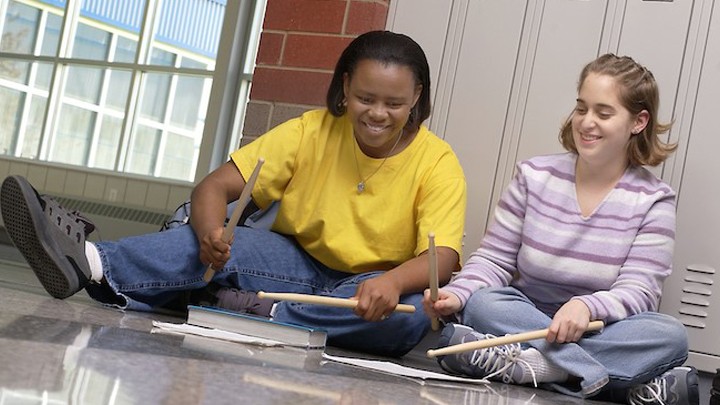RECRUITMENT TIPS
Make your beginning music recruitment events more Instagram worthy! Start by giving the event itself a more hyped-up name or connective theme. In my area, there are schools that call the initial testing day “Beginning Band Blast-Off” and schools that make the event Harry Potter themed and advertise that students will get “sorted” into their respective instrument houses. Be creative and pick names or themes that resonate with your beginning students.
Also consider creating a hashtag for your recruitment event and include it in your social media posts advertising for the day. Bonus points if your hashtag is clever, funny, or involves your school’s name or mascot in an interesting way. During the event, make sure to take photos to create more content for your social media pages and use your hashtag to tag them.
Speaking of photos, consider creating a photo op at the event itself. Schools in Northeast Arkansas have been creating a space at their beginning events that have balloon arches or streamer backgrounds. They use these spaces to take photos of each student at the event with a sign that says “Future [Insert School’s Name Here] Band / Orchestra Member.” These photos can be used across your program's social media sites or can be given to your future students or their parents to share on their personal pages. “Like” or comment on all “Future Band / Orchestra Member” posts you see and encourage your entire program to do the same. Let your new beginners feel like they are already a part of your program family.
Lastly, consider giving out door prizes, providing refreshments, or having high school or junior high students playing. Add anything to the event to make it feel special and make the future beginning students feel like they already belong in your fun, family-oriented program!
RETENTION TIP
As the school year comes to a close, use a portion of your ensemble class time to explore careers and opportunities in music that may be more unfamiliar to your students. Jobs as performers or teachers are often the first two that come to mind, but there are a plethora of other avenues that may be attractive to the different types of students that populate your ensembles. This exploration can happen in class through guests and media, or it can happen in the real world through field trips to places like music dealers, instrument repair shops, concert halls, and recording studios. You never know what aspect of music is going to hook a student for life. By expanding the types of and opportunities in music that they are exposed to, you may be able to keep a student engaged that has not formed a more immediate connection to our traditional practices. Even if they do not see themselves as a band or orchestra performer or teacher, performing in band or orchestra may be the path to their post-high school music plans!
SUCCESS TIP
Make a comprehensive list of everything you need to get done between the last day of class and the first day of instruction, be it band/orchestra camp or the start of school, for the 2022-23 school year. What pieces of music do you need copied? What inventories need updating? Do you have any projects you have put off? Once you have this master list, see if you can cross some things off it in the time between your final concert and the first day of summer vacation. Elicit help from students during their study halls or even during ensemble class. Avoid the temptation to give a free day or show a video once your concert obligations are done and ask students to help. Many hands make light work, and they will be excited to help prepare for the future. Make the work environment fun by playing recordings of your future marching show or your past concerts. The more you can get done at the end of the school year, the more you can enjoy your summer break! Keep this master list of things to do in a format that is editable year after year. Next year, at the same time, you will just need to make minor adjustments to the big to-do list. You won’t need to start from scratch!
Article was written by Sarah Labovitz, D.M.A., Assistant Chair of the Department of Music, Arkansas State University
Standing for "More to Start, Fewer to Quit," MSFQ is an open-source, monthly newsletter brought to you by the Music Achievement Council. Each month, this free resource will feature a recruiting idea, retention idea, and tip for success for music educators. The goal is to provide timely and impactful ideas that allow educators to grow their programs by recruiting new students and retaining current students

